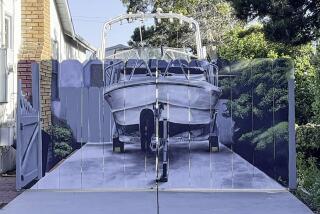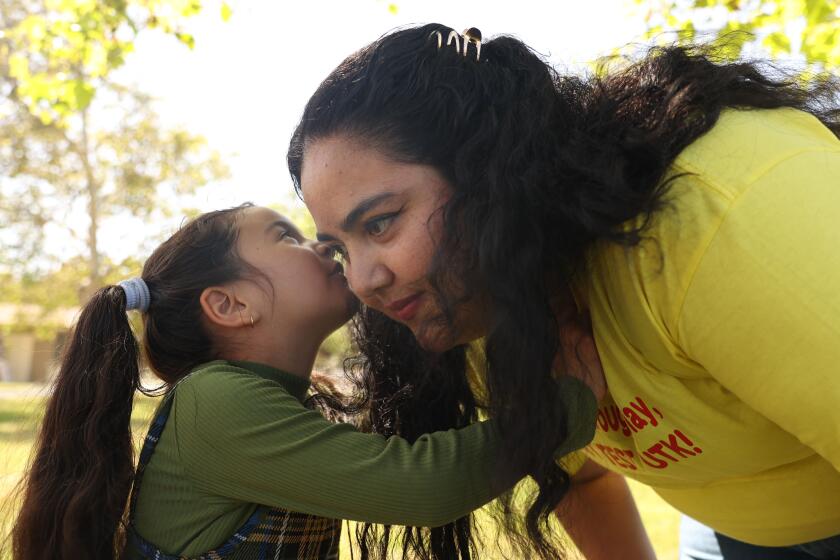TO Study OR Knot : Kids Are Told to Learn but Not Told How to; Experts Urge a Change in Approach
Ever looked down at a test and wondered where on Earth the teacher could come up with such questions? Or sit there, pencil in hand, stomach in a knot, and think: “I don’t remember anything about this stuff.”
Figuring out how to study and what to study can be one of the great frustrations of being a student.
Some time-honored strategies aren’t necessarily good ones:
Do you stay up all night cramming before a test?
Save the hard stuff to study last?
Or have music playing? The TV on?
If so, it could be that what you need to study first is how to study.
It’s a topic educators in Orange County and elsewhere acknowledge often doesn’t get the attention it deserves.
“We expect [students] to study but don’t provide them with the tools,” said Michael Martinez, associate professor and acting chair of the department of education at UC Irvine. “You would think study skills would be taught in school but in fact they are not.”
Martinez suggests that a reason for that is the traditional subject-oriented structure of education: It leaves little time for teaching study skills. “Being a teacher of educators myself, I know teachers don’t learn about what techniques are used to study efficiently,” said Martinez.
Not everyone agrees just where the teaching of study skills should take place.
Some argue that teachers are responsible for teaching a student how to study--but tell that to the instructor who has 35 kids in a class and barely enough time to teach the curriculum. Others say it’s the parents’ responsibility--but tell that to the mother or father juggling work, housekeeping and family urgencies. And then there’s the sink-or-swim chorus that says it’s up to students to figure it out.
The answer, say study specialists, is for all three--teachers, family and student--to pay more attention to studying.
There has been a lot written about study techniques in the last five or 10 years, Martinez said, and any study program should be grounded in modern theory.
Learn it, he said, don’t just memorize it. Think critically rather than just remembering the information long enough for the next test.
John Dean, superintendent of the Orange County Department of Education, stresses that parents need to be involved with their children’s education in more practical ways than simply asking if they have done their homework.
It is “terribly important that the parents get involved, turn off the TV and help the kids. Read with them; show them you’re interested. TV often takes up more time than it’s really worth.”
Dean urges parents who think their child needs help developing study habits to talk with the child’s teacher. “Many of our schools have after-school programs, or maybe all the child needs is a high school student to tutor them.”
*
Some parents, frustrated by the lack of study skills instruction in schools, turn to private education programs to get their kids on track.
Sandy Norton, a study skills specialist and teacher, twice a week goes into St. Margaret’s Episcopal high school in San Juan Capistrano. She’s been teaching students there how to study for three years now. Each course has about 10 to 12 students and runs eight weeks. The cost per student per hourlong session is $10.
“It’s not a remediation program,” Norton said. “At St. Margaret’s, the teachers are already teaching study skills in the content area. This is an enrichment and supplementing program after school.”
Norton says many students are studying four to five hours a day but not getting much out of it. The trick, she says, is to get them to remember the material in less time and have more time to play and just be kids.
Among the techniques she teaches students is the “splashdown.”
When they sit down to take a test, she tells them to first turn the test paper over and write down all the key facts, dates or formulas they’ve been studying. This information “splashdown” helps reduce test anxiety because the student is less likely to forget the information--or worry about forgetting it--and lets them concentrate on taking the test.
Norton also teaches students how to plan ahead.
“The kids learn to use long-range planning--starting the project two weeks before it’s due or studying a week before the test instead of the night before,” she said.
But one of the most important skills she teaches is self-motivation.
“There are many more working parents who really don’t have the time to sit down with the kids,” she said. “They need them to do it on their own. After the kids take the program, they come home and work independently, not having to have parents stand over them and nag.”
It amazes Norton how many kids don’t know how to manage their study time.
“They don’t know how much time they should have for play before their studies,” she said. “And they don’t know such tricks as studying the most difficult things first and most boring things first.”
*
A growing number of private centers are also teaching study skills. Some specialize in teaching one test, such as the SAT college placement exam. Others teach broad study skills to students of all ages.
Leslie Zalk, head of PMZ Inc., which owns nine Sylvan Learning Centers in Orange County, said the centers are becoming more popular because of the individual attention students receive.
The centers offer courses in reading, math, algebra, geometry, writing, and study skills as well as preparatory courses for the SAT and ACT.
A five- to six-month course costs $1,500, but, Zalk says, students get a lot of instruction for their dollar--including direct contact between the center and their regular teachers. “The teachers are extremely responsive. So we all work together to help the kid and that’s the idea,” Zalk said.
Once a child is enrolled, he or she is tested for weaknesses, and a program is then developed to improve those areas.
The student attends Sylvan twice a week for one-hour sessions for a minimum of five months. One certified teacher sits with each group of three students while they work.
“Most of the students who take the study skills course are average kids who may or may not be turning in their homework, which may or may not be complete,” Zalk said.
“A lot of the time it is an organization problem; they really don’t know what they should do to study. If they are in a class room with 35 other kids and daydreaming or not focusing and paying attention, they’re not going to get whatever’s being presented. And that’s not the school’s fault,” Zalk said.
*
To study effectively, students need to be efficient at time-management, outlining, note-taking, listening and test-taking strategies, educators say.
Ideally, a student has developed those skills by junior high; if they don’t have them by the time they reach high school, they will quickly fall behind.
A kid needs to be motivated to study, and finding what motivates them is the trick both for teachers and parents.
“The real slippery slope is motivation,” said David Boyle, principal of St. Margaret’s middle school.
“How to motivate them is unique to each kid. Most times if students are not doing well, they don’t have the fire in the belly.” he said. “To light that fire takes a combination of teachers and parents working in an ongoing process.”
(BEGIN TEXT OF INFOBOX / INFOGRAPHIC)
STUDYING TIPS
DO’S
* Before starting to read a new textbook chapter, gear your brain into studying mode by first skimming the chapter, changing chapter headings into questions you should be able to answer after reading the book.
* Next read all tables, graphs and illustrations in the chapter and then read the chapter summary. Now read the chapter.
* Underline key ideas in the text and write key words in the margin to help to study for tests later without rereading the chapter.
* Study when it’s still light outside. Minds wander to dinner and TV once the sun has set.
* Always start with the hardest tasks first, when minds are fresh.
* Try to study in the same place every time. Preferably, study at a desk, not the kitchen table. Consistency aids in concentration.
* Study in 45-minute increments with a five- to 10-minute break between.
* Take breaks between different subjects.
* When taking an exam, as soon as the test paper is handed out, turn it over and write down key facts so you don’t forget them.
DON’TS
* Don’t study with the TV on. For full concentration there should be minimal distractions.
* Don’t study with music on--even classical music.
* Don’t study in too comfortable a chair; it can induce drowsiness.
* Don’t study on an empty stomach.
More to Read
Start your day right
Sign up for Essential California for news, features and recommendations from the L.A. Times and beyond in your inbox six days a week.
You may occasionally receive promotional content from the Los Angeles Times.






